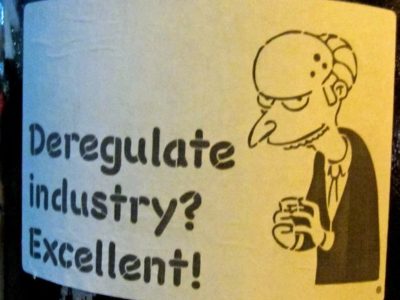NEPA as a political tool
How NEPA can change environmental outcomes through political and public pressure
This is the third in a series of posts on the reasons we might have environmental review. The first post is here. The second post is here. A frequent critique of NEPA is that it is paperwork without purpose, and thus a waste of resources. How can a statute that has no substantive requirements, and only requires analysis and public disclosure of the effects of a proposed agency action, have any impact on the environment? A partial answer is that the information...
CONTINUE READINGNEPA as an environmental back-stop
NEPA can provide analytic coverage of environmental harms that are not covered under other statutes
This is the second in a series of posts on the reasons we might have environmental review. The first post is here. Why might we have an environmental review statute such as NEPA when we already have a range of other environmental protection statutes such as the Clean Air Act, the Clean Water Act, and more? What does NEPA do that these other statutes are not already doing? One possibility is that NEPA serves as a back-stop for other environmental laws, filling i...
CONTINUE READINGGet Caught Trying
Donald Trump is committing extortion against law firms: Indict him. Now.
Bill Clinton knows a thing or two about how politics works. He famously said that the American people might not always expect you to succeed, but that they will demand that you get caught trying. And when it comes to Donald Trump’s illegal war against law firms, it’s time to get caught trying. Colloquially, it’s easy to explain. What Trump is doing to law firms – first Perkins Coie, then Paul Weiss, then Covington & Burling, then Jenner & Block, an...
CONTINUE READINGWhy do we have NEPA?
Examining the reasons why we might have environmental review can inform reform efforts
Reform, or even elimination, of environmental review for federal agency actions under the National Environmental Policy Act (NEPA) is a hot topic in the policy world right now – particularly with the Trump Administration making a range of significant changes to try and reduce the scope of NEPA. But if we want to have a serious conversation about environmental review, it’s important for us to talk about what we think environmental review does, and what it should do...
CONTINUE READINGOur 2012 Report Predicted the Future of Electric Vehicles in 2025: How Off Were We?
Time to open up the 2012 time capsule PDF
Back in 2012, CLEE and the Emmett Institute released a report called “Electric Drive by ’25,” with the relatively bold subtitle “How California Can Catalyze Mass Adoption of Electric Vehicles by 2025.” The report cited 2011-12 EV sales as reason for optimism on achieving mass adoption by 2025: Early results from the introduction of new electric vehicles to the U.S. market have been promising, with sales of both Nissan LEAFs and Chevy Volts outselling the po...
CONTINUE READINGRegulatory Rollbacks: What to Expect
A replay of 2017? Or maybe something more radical? You can probably guess the answer.
Trump’s opening round of executive orders called for rollbacks of many environmental regulations, including almost everything relating to climate. His EPA Administrator followed up with a long list of projected rollbacks. Rollbacks were a major feature of his first term, so we have some idea of what to expect. But 2025 isn’t 2017. There are likely to be some major differences, with more extreme legal positions and formal rollbacks taking second place to efforts to ...
CONTINUE READINGThe Downsides of Ping Pong Governance
Judicial review, by moderating policy swings, may be important to facilitating long-term investment
I’ve written about debates over permitting reform and other versions of regulatory streamlining to support the development of infrastructure that we need to address climate change. Another view, well articulated by Nicholas Bagley at University of Michigan, is that the problem is more fundamental: Excessive focus on governmental procedures and process, reinforced by searching judicial review, has paralyzed government and therefore undermined achieving a range of goal...
CONTINUE READINGThe CRA and the filibuster
Expanding the scope of the CRA might also result in weakening the filibuster
This is the third in a series of blog posts examining the possible application of the Congressional Review Act (CRA) to California’s waivers under the Clean Air Act allowing the state to issue its own emissions standards for motor vehicles. The first post is here. The second post is here. Another possible implication of applying the CRA to California’s waivers under the Clean Air Act is that it might open the door to a severe curtailment of the Senate filibust...
CONTINUE READINGThe CRA and permits
Applying the CRA to the California waivers might open the door to Congressional review of permits more broadly
This is the second in a series of blog posts examining the possible application of the Congressional Review Act (CRA) to California’s waivers under the Clean Air Act allowing the state to issue its own emissions standards for motor vehicles. The first post is here. The basic legal question at the heart of the dispute over whether California’s Clean Air Act waivers are subject to the CRA are whether those waivers are “rules” within the scope of the CRA. The...
CONTINUE READINGLives in the Balance: Infectious Disease and the Trump Administration
The Administration has made serious inroads on safeguards against infectious disease.
The federal government has traditionally worked to limit the risks and impacts of epidemics. At a time when scientists are increasingly worried about a possible H1N5 epidemic like the 1917 flu, the erosion of the U.S. public health system by the current Administration creates particular ground for alarm. Disease control, like many other traditional government activities, has been under a MAGA-driven onslaught. Earlier this year, the Trump Administration moved to des...
CONTINUE READING







